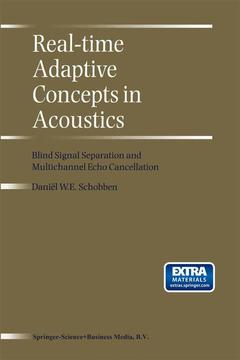Description
Real-Time Adaptive Concepts in Acoustics, Softcover reprint of the original 1st ed. 2001
Blind Signal Separation and Multichannel Echo Cancellation
Author: Schobben D.E.
Language: English
Subjects for Real-Time Adaptive Concepts in Acoustics:
Approximative price 105.49 €
In Print (Delivery period: 15 days).
Add to cart
Real-Time Adaptive Concepts in Acoustics
Publication date: 11-2012
160 p. · 16x24 cm · Paperback
Publication date: 11-2012
160 p. · 16x24 cm · Paperback
Approximative price 105.49 €
Subject to availability at the publisher.
Add to cart
Real-time adaptive concepts in acoustics (with CD-Rom)
Publication date: 07-2001
160 p. · 15.5x23.5 cm · Paperback
Publication date: 07-2001
160 p. · 15.5x23.5 cm · Paperback
Description
/li>Contents
/li>
Blind Signal Separation (BSS) deals with recovering (filtered versions of) source signals from an observed mixture thereof. The term `blind' relates to the fact that there are no reference signals for the source signals and also that the mixing system is unknown. This book presents a new method for blind signal separation, which is developed to work on microphone signals.
Acoustic Echo Cancellation (AEC) is a well-known technique to suppress the echo that a microphone picks up from a loudspeaker in the same room. Such acoustic feedback occurs for example in hands-free telephony and can lead to a perceived loud tone. For an application such as a voice-controlled television, a stereo AEC is required to suppress the contribution of the stereo loudspeaker setup. A generalized AEC is presented that is suited for multi-channel operation.
New algorithms for Blind Signal Separation and multi-channel Acoustic Echo Cancellation are presented. A background is given in array signal processing methods, adaptive filter theory, and fast filtering in the frequency domain.
The included CD-ROM can be played using any compact disc player to play the simulation results that are described in the text. When inserted into a computer, it furthermore gives Matlab implementations of the new algorithms along with audio data with which to experiment. This makes the book suited to researchers, engineers, and university students, who want to get acquainted with these emerging fields.
Acoustic Echo Cancellation (AEC) is a well-known technique to suppress the echo that a microphone picks up from a loudspeaker in the same room. Such acoustic feedback occurs for example in hands-free telephony and can lead to a perceived loud tone. For an application such as a voice-controlled television, a stereo AEC is required to suppress the contribution of the stereo loudspeaker setup. A generalized AEC is presented that is suited for multi-channel operation.
New algorithms for Blind Signal Separation and multi-channel Acoustic Echo Cancellation are presented. A background is given in array signal processing methods, adaptive filter theory, and fast filtering in the frequency domain.
The included CD-ROM can be played using any compact disc player to play the simulation results that are described in the text. When inserted into a computer, it furthermore gives Matlab implementations of the new algorithms along with audio data with which to experiment. This makes the book suited to researchers, engineers, and university students, who want to get acquainted with these emerging fields.
List of Figures. Preface. Part I: Background and Introduction. 1. Introduction. 2. Array Processing Techniques. 3. Efficient Filtering Using FFTS. Part II: Acoustic Echo Cancellation. 4. An Efficient Adaptive Filter Implementation. 5. Efficient Multichannel RLS. Part III: Blind Signal Separation. 6. Blind Signal Separation, An Overview. 7. A Blind Signal Separation Algorithm. 8. Joint Blind Signal Separation and Echo Cancellation. 9. Blind Signal Separation Algorithm Evaluation. 10. Conclusions. Appendices.
© 2024 LAVOISIER S.A.S.




